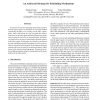Free Online Productivity Tools
i2Speak
i2Symbol
i2OCR
iTex2Img
iWeb2Print
iWeb2Shot
i2Type
iPdf2Split
iPdf2Merge
i2Bopomofo
i2Arabic
i2Style
i2Image
i2PDF
iLatex2Rtf
Sci2ools
104
click to vote
IPPS
2005
IEEE
2005
IEEE
An Antisocial Strategy for Scheduling Mechanisms
Previous work on task scheduling mechanisms assumed that the agent’s goal is to maximize its own profit without considering the effect of its strategy on the other agents’ profit. This is not always the case, an agent may want to cause loses to the other agents besides maximizing its profit. Such an agent is said to be an antisocial agent. An antisocial agent will try to gain as much profit as possible relative to the other agents. In this paper we consider a mechanism for task scheduling on related machines in which each machine is associated with an agent. We develop an antisocial strategy which can be used by an antisocial agent to inflict losses to the other participating agents. We analyze the effect of different degrees of agent’s antisociality on the losses inflicted to the other agents.
Antisocial Agent | Distributed And Parallel Computing | IPPS 2005 | Task Scheduling | Task Scheduling Mechanisms |
Related Content
| Added | 25 Jun 2010 |
| Updated | 25 Jun 2010 |
| Type | Conference |
| Year | 2005 |
| Where | IPPS |
| Authors | Nandan Garg, Daniel Grosu, Vipin Chaudhary |
Comments (0)

